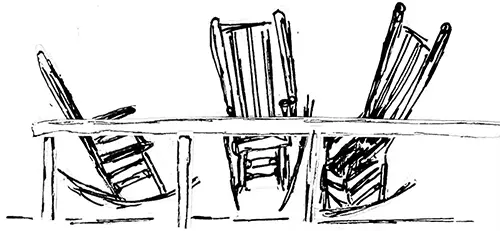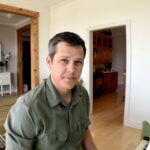Wendell Berry 212
“Oh, Wow.” A Benediction for Ed McClanahan
Immortality might not last forever. But I contend that Ed will—through his words and through the lives of those he touched with his generosity and his grace. All of which…
Spiritual Secession: A Conversation with Paul Kingsnorth
" None of your readers need me to tell them that the useful work is practical, particular, small and careful: to get away from screens as much as we can, get…
The Road Taken
Sometimes an important change becomes evident only in retrospect - not while it’s happening across quiet broken days alone in a house while autumn succumbs to shadow and cold.
Staying Sane in a Mad Time
How might we discern the truth in a mad time? Wendell Berry and G.K. Chesterton offer some wisdom.
Vanishing Little Languages
Andrew Figueiredo describes his family connection to Minderico, a language belonging to the Portuguese town of Minde. Localists must join the fight to save endangered languages, if only because they…
Lonely in the Center
Hassler and McDonagh conclude their stories with the hope that, in the absence of the clergy, faithful everyday Christians can rebuild the lost soil of local culture through faith and…
James Rebanks in Conversation: Pastoral Song
James Rebanks and Grace Olmstead discuss his book, Wendell Berry, his vision for future farming methodologies, and the conversations surrounding agricultural reform in both the United States and the United…
Epistemology on the Front Porch: Esther Lightcap Meek
Esther Lightcap Meek on Wendell Berry, Michael Polanyi, and covenant epistemology.
Civilization, Escape, or Community: Revisiting Into the Wild with Wendell Berry
Wendell Berry pleads with us to see that true joy and fulfillment— the very motivations at the heart of Huck Finn and Christopher McCandless—are to be found not in escape…
The Restorative Tonic of Wildness
Particularly in a culture that values comfort and convenience, we need to listen to those who have encountered wilderness with the humility and attentiveness necessary to receive its instruction.
Larry McMurtry and Wendell Berry at the Dairy Queen
McMurtry couldn’t quite set the Bowie knife to the scalp of the Western like Cormac McCarthy did the same year, maybe because he knew those people weren’t grotesque caricatures; they…
Grace Olmstead on Uprooted, Place, Idaho, and Prairie Lupines
Fidelity to place needn’t (and shouldn’t) result in stuckness, a condemnation of ever moving at all. But we must beware falling into that second trap: rejecting roots altogether.
The Roots of America’s Falling Fertility
Human fertility is not the root of our problems. It is but one symptom of a deeper, more elemental problem.
Men in the Field: The Farming Stories of Leo L. Ward, C.S.C.
The best stories in the volume offer Cather-esque explorations of the links between place and people. The stories are remarkable for their dense layers, for their social, psychological, and emotional…
From the Editor–Local Culture 3.1: The Arts of Region and Place
Is only the life of the busy and bustling place, the place of mergers and acquisitions, worthy of story and song and canvas?
A Pastoral Inheritance: James Rebanks and a Tribute to Our Late Cathedral Sacristan
There is much wisdom contained in English Pastoral for suffering churches. If the last fifty years have shown that innovation and modernization aren’t the solution to our ill-health, they have…
A Metaphysics of Place: Reintegrating Nous and Cosmos at the Foot of the Burning Bush
Even in the midst of this sad era of cold, objective ambition, the possibility of grateful participation in the cosmic life of creation remains for each of us.
Where Is Our Freedom to Exercise Sympathy?
The same things that happened to the family farms, and to farmers like my father, are now happening to the colleges, and to faculty like me.
Embattled: The Story of the O’Hanlon Fresco
Mill Valley, CA. As our country struggles to come to terms with its racist past—and present—a controversy surrounding a 1934 mural at the University of Kentucky mirrors the racial tensions…
Learning to Live a Second Life in Two Stories by John Berger and Wendell Berry
There are second chances for some of us, but even second chances bring new losses. For me, it is the grace and hope of these stories and others like them…
The Roots of an American Mover
The sins of the movers may be visited upon their children, but it’s possible for the children to suffer well the consequences of their parents’ and grandparents’ decisions.
Baldwin, Buckley, and Berry on Racism and the World Order
Drawing from both Baldwin and Berry allows us to see that the racist and imperial policies of the past continue to do immense social, economic, cultural, and ecological damage around…
Work and Prayer: The Brief Friendship of Thomas Merton and Wendell Berry
Berry wrote in one of his letters to Merton that “you are one of the few whose awareness of what I’m doing here would be of value to me.” He…
For the Hog Killing, 1979 and the Work of Photography
Perhaps the appealing vision of neighborliness that For the Hog Killing, 1979 presents, and the image of agricultural community that it provides, can challenge those of us who are encouraged…

















